
INDIAN JOURNAL OF FISHERIES
Scope & Guideline
Cultivating insights for responsible fishing practices.
Introduction
Aims and Scopes
- Fisheries Biology and Ecology:
Research on the biological and ecological aspects of various fish species, including growth, reproduction, feeding habits, and population dynamics. - Aquaculture Innovations:
Studies focused on improving aquaculture practices, including nutritional formulations, breeding techniques, and disease management in farmed species. - Stock Assessment and Management:
Assessment of fish stocks, including methodologies for evaluating fishery sustainability and population dynamics to inform management decisions. - Environmental Impact Studies:
Investigations into the effects of environmental factors on fish populations and ecosystems, including water quality assessments and habitat studies. - Socio-Economic Research in Fisheries:
Exploration of the socio-economic dimensions of fisheries, including livelihood assessments, market dynamics, and community engagement in sustainable practices. - Pathogen and Disease Research:
Research on fish diseases, their causes, effects, and management strategies, including studies on bacterial, viral, and parasitic infections.
Trending and Emerging
- Climate Change Impact on Fisheries:
There is a growing body of research examining the effects of climate change on fish populations, ecosystems, and aquaculture practices, highlighting the urgency of addressing environmental challenges. - Sustainable Aquaculture Practices:
Increased interest in sustainable aquaculture methods, including the use of alternative protein sources and integrated farming systems, is trending as researchers seek to minimize the ecological footprint of fish farming. - Health and Nutrition of Aquatic Species:
Emerging studies focus on the nutritional requirements and health management of aquaculture species, emphasizing the role of diet in enhancing growth and disease resistance. - Technological Innovations in Fisheries:
Research on the application of technology in fisheries, including IoT for monitoring fish health and environmental conditions, is gaining prominence. - Microplastics and Fisheries:
The investigation of microplastics in aquatic environments and their impact on fish health and ecosystems is an emerging area of concern, reflecting growing environmental awareness. - Molecular and Genetic Studies:
Advancements in molecular techniques for species identification, genetic diversity assessment, and breeding programs are increasingly featured, highlighting the role of biotechnology in fisheries.
Declining or Waning
- Traditional Fishing Practices:
Research focusing on traditional fishing methods is becoming less prevalent as modern aquaculture and sustainable practices gain more attention. - General Marine Biodiversity Studies:
While biodiversity is still relevant, the focus has shifted towards more specific studies that address conservation and management strategies rather than broad assessments. - Historical Fisheries Analysis:
Studies that analyze historical data without contemporary relevance are declining, as the journal increasingly prioritizes current and actionable research. - Invasive Species General Studies:
General studies on invasive species are less common, with a trend towards focused research that explores the impacts of specific invasive species on local ecosystems.
Similar Journals

FISHERY TECHNOLOGY
Advancing sustainable practices in fisheries science.FISHERY TECHNOLOGY is a distinguished journal dedicated to the advancement of knowledge in the field of fisheries science and technology. Published by the Society of Fisheries Technologists, India, this journal serves as a vital platform for researchers, professionals, and students across the globe to disseminate innovative findings and methodologies related to fishery practices, aquatic ecosystem management, and sustainable fishing technologies. With its ISSN 0015-3001, FISHERY TECHNOLOGY seeks to uphold the standards of scholarly research and contributes significantly to the discourse surrounding marine resources and their sustainable utilization. Although currently not available in an open-access format, the journal remains committed to reaching a wide audience through reputable distribution channels. The journal is characterized by its goal to bridge theoretical research with practical applications, thereby impacting both the scientific community and the fishing industry. Engage with FISHERY TECHNOLOGY to keep abreast of the latest developments and contribute to the sustainable management of aquatic resources.

FISHERY BULLETIN
Connecting Scholars for Sustainable Fisheries SolutionsFISHERY BULLETIN, published by the NATL MARINE FISHERIES SERVICE SCIENTIFIC PUBL OFFICE, serves as a pivotal resource in the field of Aquatic Science, offering valuable insights into fisheries science and management since its inception in 1881. With an Open Access model, the journal ensures that researchers, professionals, and students can access cutting-edge research freely, fostering greater collaboration and innovation within the community. The journal boasts a substantial history of publication, encompassing articles from 1979 to 2024, and has achieved a respectable Q3 Quartile ranking in its category for 2023, highlighting its influence amid its peers. It currently ranks #161 out of 247 in the Scopus database for Agricultural and Biological Sciences, with a 35th percentile ranking, indicative of the quality and relevance of its contributions. The FISHERY BULLETIN stands out as an essential platform for disseminating significant findings and advancing knowledge relevant to sustainable fisheries and marine resource management, making it an indispensable tool for academic researchers and industry practitioners alike.
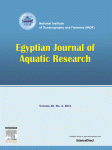
Egyptian Journal of Aquatic Research
Unveiling innovative research in water science.Welcome to the Egyptian Journal of Aquatic Research, a premier peer-reviewed academic journal published by ELSEVIER, dedicated to advancing the field of aquatic sciences. With a robust impact factor and recognition as a Q1 journal in key categories such as Aquatic Science and Ecology, this open access journal has established itself as a vital platform for disseminating high-quality research since its inception in 2012. The journal aims to provide comprehensive coverage of topics including ecology, evolutionary biology, and water science, making it a crucial resource for researchers, professionals, and students engaged in these dynamic fields. With Scopus rankings placing it in the top echelons of various categories, the Egyptian Journal of Aquatic Research fosters innovation, collaboration, and knowledge dissemination on a global scale, making it an indispensable asset for anyone invested in understanding and preserving aquatic systems.
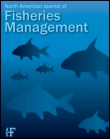
NORTH AMERICAN JOURNAL OF FISHERIES MANAGEMENT
Empowering Research for Responsible Fisheries PracticesNORTH AMERICAN JOURNAL OF FISHERIES MANAGEMENT, published by WILEY, is a premier peer-reviewed journal dedicated to advancing the science and management of freshwater and marine fisheries across North America. With an ISSN of 0275-5947 and E-ISSN of 1548-8675, this esteemed journal has been a crucial platform for innovative research from its inception in 1981 through to its anticipated evolution in 2024. The journal is recognized for its rigorous scholarship, evidenced by its impact in various categories with a Q2 ranking in Aquatic Science, Ecology, and Ecology, Evolution, Behavior and Systematics, as well as a Q3 ranking in the domain of Management, Monitoring, Policy and Law. Researchers and practitioners can access cutting-edge findings that address critical environmental challenges and promote sustainable fisheries management. With a consistent focus on ecological implications and policy development, this journal serves as an essential resource for those aiming to make a significant impact in fisheries science and management.
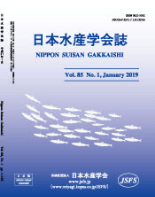
NIPPON SUISAN GAKKAISHI
Illuminating the Science of Aquatic EcosystemsNIPPON SUISAN GAKKAISHI, published by the Japanese Society of Fisheries Science, is a prestigious journal with a long history dating back to its inaugural issue in 1932. This journal, which spans key contributions to the field of Aquatic Science, serves as a vital platform for the dissemination of important research findings related to fisheries and aquatic biology, fostering knowledge and innovation in Japan and beyond. Although it is not an open-access publication, its rigorous peer-review process ensures the quality and integrity of the articles published. The journal is currently listed in the Q4 category for Aquatic Science according to the 2023 metrics, placing it within a niche but significant corner of the research landscape. With an ISSN of 0021-5392 and E-ISSN of 1349-998X, it continues to provide essential insights that benefit researchers, professionals, and students alike, highlighting advancements and challenges within aquatic ecosystems over a converged year span that continues to evolve through to 2024.

Journal of Fisheries
Illuminating the path to sustainable fishing practices.The Journal of Fisheries, an esteemed publication by BDFISH, serves as a pivotal platform for disseminating cutting-edge research in the field of fisheries science. With its commitment to Open Access since 2013, the journal ensures that vital knowledge is accessible to researchers, professionals, and students worldwide, promoting widespread dissemination of fishery-related discoveries. By featuring high-quality peer-reviewed articles, the Journal of Fisheries aims to advance the understanding of aquatic ecosystems, sustainable fishing practices, and the broader implications of fisheries on biodiversity and food security. Located at the Dept of Fisheries, University of Rajshahi, Bangladesh, this journal plays a crucial role in fostering academic dialogue and collaboration, contributing significantly to the growth and development of fisheries research globally.

CANADIAN JOURNAL OF FISHERIES AND AQUATIC SCIENCES
Elevating standards in fisheries and aquatic research.The Canadian Journal of Fisheries and Aquatic Sciences, published by Canadian Science Publishing, stands as a premier interdisciplinary journal dedicated to advancing knowledge in the fields of aquatic sciences, ecology, and evolutionary biology. With a longstanding history of publication since 1980, this journal delivers high-quality, peer-reviewed research that contributes to the understanding of aquatic ecosystems and the sustainable management of fisheries. The journal is esteemed for its rigorous standards and currently holds a Q1 ranking in both Aquatic Science and Ecology, Evolution, Behavior, and Systematics as of 2023, evidencing its significant impact in these critical areas. Researchers, professionals, and students alike can expect compelling explorations of both fundamental and applied aspects of aquatic sciences. While the journal offers traditional access, it remains committed to disseminating pivotal research findings to foster a vibrant community of scholars and practitioners striving towards innovative solutions for aquatic environmental challenges.
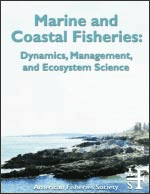
Marine and Coastal Fisheries
Navigating contemporary challenges in aquatic ecosystems.Marine and Coastal Fisheries, published by Wiley, is a leading open access journal that has been dedicated to advancing the field of fisheries science since its inception in 2009. With an esteemed Q1 ranking in Aquatic Science and a Q2 ranking in Ecology, Evolution, Behavior and Systematics as of 2023, the journal actively contributes to the understanding and management of marine and coastal ecosystems.
This journal serves a diverse audience ranging from researchers and practitioners to students, providing a platform for high-quality peer-reviewed articles that address contemporary challenges in fisheries management and conservation. With a commitment to global accessibility, Marine and Coastal Fisheries promotes the dissemination of scientific knowledge to enhance sustainable practices in marine environments, making it an essential resource for those invested in the health of aquatic ecosystems. To explore the latest research and insights, visit the journal's website and engage with the thriving community of marine science professionals.
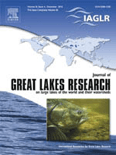
JOURNAL OF GREAT LAKES RESEARCH
Innovating Research for Sustainable Aquatic FuturesJOURNAL OF GREAT LAKES RESEARCH is a prestigious academic journal published by Elsevier Science Ltd, focused on the vital field of aquatic sciences and ecology. With a long-standing history since its inception in 1975, this journal proudly ranks in the Q1 quartile across multiple categories, including Aquatic Science and Ecology, as of 2023, reflecting its significant contribution to the scientific community. The journal's impact is underscored by its impressive Scopus rankings, placing it within the top percentile of scholarly publications in related disciplines. Although it operates under a subscription model, its influence extends globally, serving as a critical resource for researchers and professionals dedicated to understanding the Great Lakes ecosystem and its broader ecological implications. As it converges into its future publications through 2024, JOURNAL OF GREAT LAKES RESEARCH remains an essential platform for innovative research that shapes environmental policy and promotes sustainable practices in aquatic environments.

Journal of Ichthyology
Fostering Scholarly Discourse in Fish BiologyJournal of Ichthyology, published by PLEIADES PUBLISHING INC, is a respected periodical in the field of aquatic sciences and biological studies, focusing extensively on the study of fish and their ecosystems. With an ISSN of 0032-9452 and E-ISSN of 1555-6425, this journal serves as an essential platform for researchers seeking to publish innovative findings related to ichthyology and broader aquatic biological sciences. Although currently not an open-access journal, its high relevance is reflected in its impact factor and varied audience, addressing pressing issues in biodiversity, conservation efforts, and fish biology. The journal's classification indicates a Q3 ranking in Agricultural and Biological Sciences and a Q4 ranking in Aquatic Science for 2023, affirming its contributions to the field despite its percentile standings in Scopus ranking. The journal has a publication history that spans critical converged years from 1976 to 2024, making it a vital resource for ongoing research developments and scholarly discourse. For academics, professionals, and students alike, the Journal of Ichthyology remains a key resource for advancing knowledge and enhancing the understanding of fish biology and their ecological impacts.